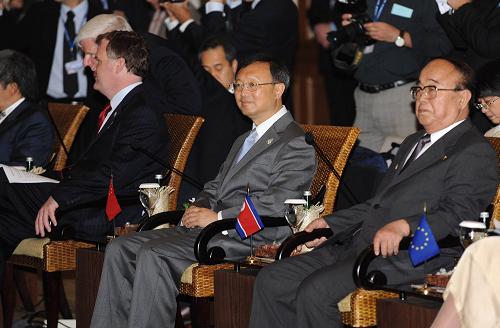
On July 23, 2011, Foreign Minister Yang Jiechi attended the 18th Association of Southeast Asian Nations (ASEAN) Regional Forum (ARF) Foreign Ministers' Meeting in Bali, Indonesia and made remarks.
He said that Asia-Pacific as a whole has maintained peace and stability over past several decades. Economy of the region grows rapidly and cooperation there develops vigorously. Various mechanisms coordinate with each other and move forward together. However, there still exist unstable factors, including the territorial disputes and the traditional and non-traditional security threats left over from history. It is the common consensus of countries in the region to solve differences through dialogue and negotiations and handle challenges through cooperation.
He pointed out that to grow the economy and improve people's livelihood still top the agenda of Asia-Pacific. All countries must always give priority to maintaining regional peace and stability, practise the new outlook of security, trust instead of being suspicious of each other, cooperate instead of confronting each other, settle disputes in peaceful ways and jointly safeguard peace and stability in Asia-Pacific.
He noted that China will stick to the road of peaceful development, pursue the win-win strategy of opening up, continue the policy of friendship and partnership with the neighboring countries, develop friendly cooperation with all the other countries in Asia-Pacific on the basis of the Five Principles of Peaceful Coexistence and work with them to build peace and stability, equality and mutual trust and win-win cooperation in the region.
Concerning the South China Sea issue raised by some countries at the meeting, Yang said that it is true there are disputes concerning the sovereignty over some islands and reefs and the delimitation of certain waters in the South China Sea. Such disputes should be solved peacefully by the countries directly related through friendly consultations. There exist open channels of dialogue and consultation between countries concerned. The situation in the South China Sea in general is peaceful and stable, which is also true. To handle disputes properly, try to narrow down differences, increase mutual trust constantly, expand cooperation actively and maintain the overall situation of peace and stability serve the interest of all countries in the region and in this direction all countries should work hard. The guideline to implement the Declaration on Conduct of Parties in the South China Sea adopted by China and ASEAN lately is exactly the result of active efforts of all parties concerned.
He mentioned that the importance of navigation freedom and safety in the South China Sea is self-evident. The disputes and the navigation freedom in the South China Sea are two different issues. The South China Sea is an international sea-route. Navigation there is free and safe, which benefits all countries both inside and outside the region. Navigation freedom and safety in the South China Sea are vital to Asia and the surrounding countries and in that direction China has made unremitting efforts with relevant parties. Navigation freedom in the South China Sea is not impeded, and should not be allowed to be impeded in the future.
Yang also elaborated the opinions, position and proposition of the Chinese side on the situation of the Korean Peninsula, Burma, Afghanistan, South Asia, West Asia and North Africa.
On the same day, he also met with Australian Foreign Minister Kevin Rudd. The two leaders indicated the importance they attach to the China-Australia relations. They expect to take the opportunity of the 40th anniversary of the bilateral diplomatic ties next year to further step up the bilateral relations.
